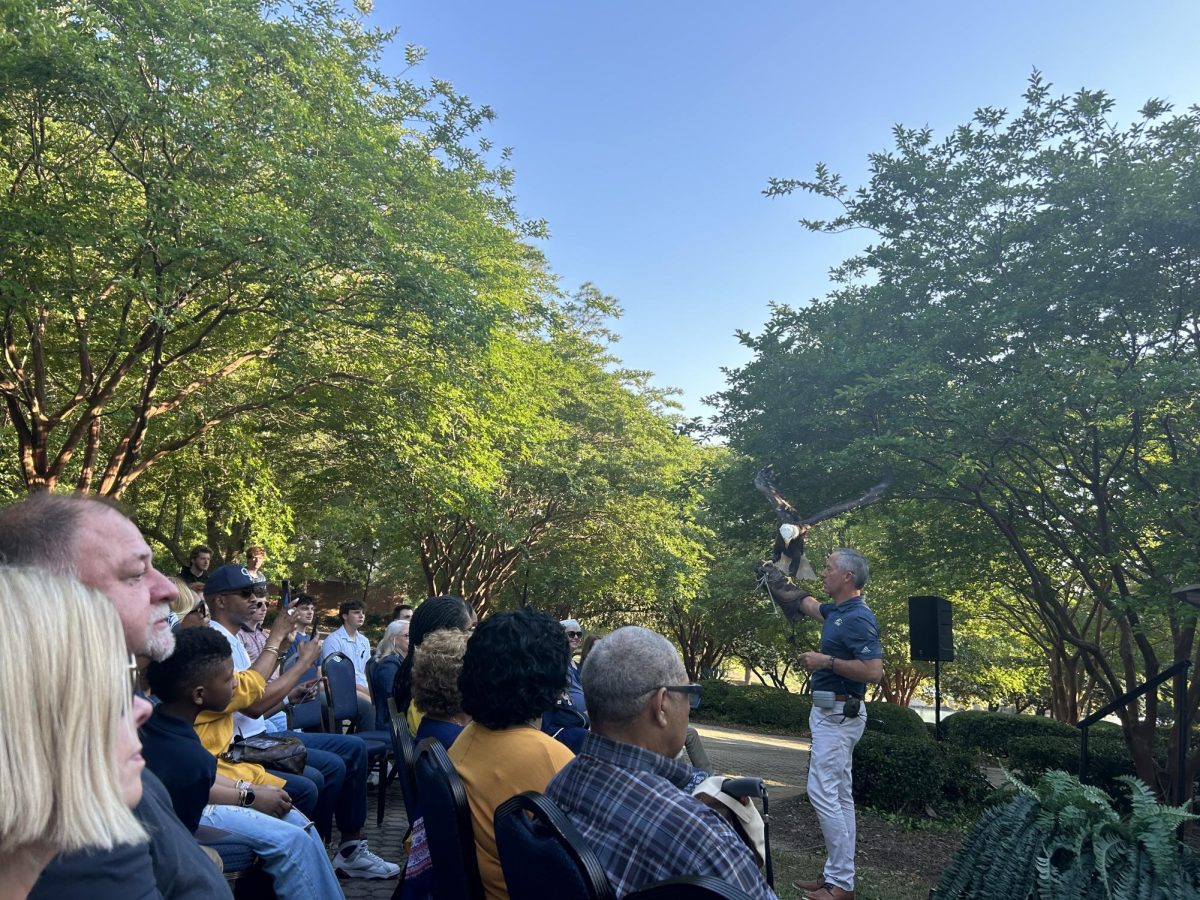What’s new: A resolution condemning the invasion of Israel by Hamas did not pass at the last SGA meeting on Oct. 23th, 2023. The vote was broken down into two supporting the resolution, seven against the resolution and 25 abstentions. The SGA members who opposed the vote cited the resolution as not representing the values of the University as the resolution could potentially bring harm to Palestinian students. While students have not specifically stated support for the resolution, there were multiple students who spoke out against the resolution at the meeting.
“As senators it is their role to do what is best for the students, therefore senators voted with the students who were actively at the meeting, stating they were against the resolution,” said Kelsi Simpson, Student Government Leadership Coordinator.
- Multiple Palestinian women expressed concerns that this resolution would leave them fearing for their safety and could potentially bring them violence.
- There were heated debates about the issue and factual points were expressed on both sides.
- Supporters of the resolution cited “Discrimination based on religion or nationality is inherently wrong.”
- Here is a link to the resolution :Senator Mincey’s Resolution_ 89-2
- Healthy debate is a key component when addressing the issues of the world.
“It is important to hear both sides, not just one, regardless if it is something they wanted to hear, they needed to hear it,” said Simpson.
………………………………………………………………………………………….
Why it matters: The debate over the Jewish population or the Palestinian population having a rightful claim to the holy land has been ongoing for thousands of years according to Becky Little, a journalist for History. Since 1948 with the founding of Israel as a Jewish homeland, there has been conflict between the native Palestinians and Israelis. The Deir Yassin massacre and the Arab-Israeli war are some examples, however the history of this topic cannot adequately be explained in a brief news story. Linked is an in depth analysis on the history and perspectives of the situation.
- Palestinians who live in Gaza and the West Bank face immense hardships in their everyday lives. Their mobility is limited, their job availability is limited, their access to good healthcare is limited, voting rights are limited, education is limited and above all they live under the constant threat of violence.
How we got here: On Oct. 7th, 2023, Hamas invaded Israel. The attack began at dawn with Hamas firing thousands of rockets into Israel. Armed fighters flew over the border from Gaza into Israel on paragliders. Simultaneously drones fitted with explosives targeted remote control guns and destroyed cell towers. Israeli Defense Forces were unaware of the scale of the attack as they lost communication. Fighters then went on to blow up numerous sections of the border fences allowing trucks, motorbikes and fighters to pour into Israel. Hamas swiftly took over military outposts along the border. The Israeli Defense Force stated the border wall was breached at 30 different locations. Around 1,400 Israelis were killed as a result of Hamas’s surprise attack. The death toll for Palestinians has surpassed 10,000.
What’s next: “The Biden administration is planning a $320 million transfer of precision bombs for Israel,” stated Jared Malsin, Middle East correspondent, The Wall Street Journal.
- Algeria, African Union, Belize, Brazil, Colombia, Cuba, Indonesia, Iraq, Iran, Ireland, Kuwait, Morocco, Malaysia, Maldives, Norway, Oman, Pakistan, Qatar, Russia, Syria, South Africa and Venezuela have criticized Israel’s use of force in Gaza according to Al Jazeera.
- “Israel is one of Georgia’s strongest allies and greatest friends, and our support for its people as they endure horrific attacks from terrorists is unwavering,” said Gov. Brian Kemp
- The war is changing everyday. The war has been ongoing for a month and it is impossible to tell what this war will look like in the long run, considering the war is still in its early days.
Background
The scope of this situation goes beyond what can be explained in a short news story. The history is complex, divisive and bloody. There are multiple lenses to examine this situation through, so I am going to try and explain the history thoroughly and objectively.
The Ottoman Empire controlled the area known as Palestine from 1516-1918. During World War I, Britain issued the Balfour Declaration in 1917. The declaration promised “The establishment in Palestine of a national home for the Jewish people.” Britain established a colony in Palestine following World War I. The Jewish population in Palestine increased by over 320,000 between 1920 and 1939. Tensions increased between the native Arab Palestinians and Jewish Palestinians, as the Jewish population began purchasing farmland and evicting Palestinian farmers. Conflict arose as a result of growing Palestinian nationalism in 1936. The Arab Palestinians fought to end British occupation and the “open-ended Jewish immigration and land purchases with the stated goal of establishing a ‘Jewish National Home.” The British suppressed the revolt but made efforts to compromise with both sides. Britain limited Jewish migration to Palestine and called for the establishment of a joint Arab and Jewish state in Palestine within the next ten years. This did not resolve the conflict though as both sides did not feel like they benefited from the compromise.
Following World War II, the British decided they could not solve the situation. As a result, Britain allowed the newly founded United Nations to create a solution. The United Nations created a partition plan for Palestine in 1947 that split the territory into two states that were relatively equal in size. The problem was that the territory was fragmented and did not create peace, as again both sides did not feel they were adequately supported.
The 1948 Arab-Israeli war ensued as a result of the partition plan of 1947. The Israelis won the war and the Palestinian’s (backed by many Arab countries) lost a majority of their territory. After the war Israel controlled 77% of the Palestinian territory. More than half of the Palestinian population became displaced, ending up in refugee camps in neighboring Arab countries, Gaza and the West Bank. Israelis considered the result of the war the founding of their nation, while the Palestinians refer to the event as the Nakba or the “disaster.”
In 1967, the Six-Day War erupted and Israel won the war. As a result Israel gained control of the Gaza Strip, the West Bank, the Sinai Peninsula and the Golan Heights. The war intensified Israel’s control over the area as one million Palestinians were now under Israeli occupation and over a half million Palestinians were forced to flee to neighboring Arab countries. The United Nations recognized the need for a Palestinian and Jewish State and created the framework for Israel to release Palestinian territory back to Palestine, but that didn’t happen.
Palestinians tried to revolt against Israeli rule in 1987 which is known as the “Intifada” or uprising. Palestinians started protesting and boycotting Israeli occupation. Tensions escalated as Israeli armed forces violently cracked down on protestors. Palestinian citizens faced heavy casualties, but the conflict opened the door for peace talks and diplomacy.
Hamas was founded in 1987 after the first Intifada in Gaza. Hamas committed their first suicide bombing against Israel in 1993. Hamas built infrastructure in Gaza including: schools, hospitals, mosques, and other social welfare programs. Hamas gained support because they created infrastructure.
The Oslo Accords of 1993 were the first steps in peaceful diplomacy. The Palestine Liberation Organization (PLO) recognized Israel’s sovereignty and Israel promised the Palestinian Authority (PA) would take over governing responsibilities in the West Bank and Gaza Strip over the next five years.
In 2000, prime minister candidate Ariel Sharon led a group of 1,000 armed guards to Haram al-Sharif, the site of the gold Dome of the Rock that is the third holiest shrine in Islam. The provocative move sparked protests from the Palestinian people.
The situation escalated as Israeli forces conducted firefights, targeted killings, tank and aerial attacks. Palestinians engaged in stone-throwing, rocket attacks, suicide bombings and firefights. The second Intifada signaled a clear escalation in violence compared to the first Intifada. Death tolls topped around 3,000 Palestinians, 1,000 Israelis and 64 foreigners.
Hamas seized power from the Palestinian Authority (PA) in 2007. Since then Hamas has maintained administrative control in parts of Gaza. Hamas and the Palestinian Authority share seats in parliament.
Hamas has engaged in conflict with Israel since coming to power in 2007. Hamas frequently sends rockets and mortars into Israel. Israel responds by sending forces into Palestinian territory killing thousands of civilians and combatants. Both sides justify provocations by citing they are responding to provocations made by the other side.
The Palestinian people believe they have been denied a state for many years prior to the foundation of Israel. The Palestinian people have also been systemically stripped of their territory since the 1947 partition plan. Millions of Palestinians have become Internally Displaced Persons (IDPs). Palestinians now live under Israeli occupation in the West Bank and Gaza. In 2006-2007, Israel and Egypt created a blockade around Gaza. As a result of the blockade, more than one million Palestinians rely on International aid to survive. Gaza has been referred to as an open-air prison because of the limitation of movement by Israeli forces. Receiving adequate medical treatment is also difficult in Gaza and the West Bank.
The Jewish population clearly needs a nation-state and Israel has a right to defend itself against outside threats. Israel has been under threat since the founding of their nation. Provocations made by both sides have accumulated into the conflict we are seeing today.
Oct. 7th, 2023- a date the world will never forget. The attack began at dawn with Hamas firing thousands of rockets into Israel. Armed fighters flew over the border from Gaza into Israel on paragliders. Simultaneously drones fitted with explosives targeted remote control guns and destroyed cell towers. Israeli Defense Forces were unaware of the scale of the attack as they lost communication. Fighters then went on to blow up sections of the border fences allowing trucks, motorbikes and fighters to pour into Israel. Hamas swiftly took over military outposts along the border. The Israeli Defense Force stated the border wall was breached at 30 different locations.
Hamas committed war crimes across Israel. Hamas went to as many as 22 locations, killing, kidnapping and committing savage acts of violence. Hamas attacked the Nova music festival killing over 260 people and taking others hostage.
After two days of fighting Israel claimed to regain control of all territory. Around 1,400 Israelis were killed as a result of Hamas’s surprise attack. Hamas’s acts of violence against Israel are completely unjustifiable because the killing and kidnapping of innocent Jews is inherently wrong. Israel’s retaliation against Hamas has also been considered unjustified as 10,000 plus Gazans are dead and half of the deaths have been children. Both acts of violence can be condemned, an eye for an eye leaves the whole world blind.
Israel’s response to the violence committed has been swift. Israel has sent airstrikes day and night into Gaza. The death toll for Palestinians has surpassed 10,000. Israel has cut off water and power to Gaza and has told the Gazan population to leave the northern area and go south. Gazans are currently stuck in Gaza as the border into Egypt is closed. Only a limited number of severely injured Gazans have been allowed into Egypt. Israel continues to airstrike Gaza until Hamas surrenders. Multiple countries have issued statements urging a ceasefire. Experts are speculating the events happening in Gaza is considered a genocide.
Roughly 240 hostages still remain in Gaza with Hamas. It is unlikely that Israel will enact a ceasefire until all hostages are freed. The idea of prisoner exchanges begs the question of how many Palestinian prisoners Israel is willing to exchange. Israel has 6,700 Palestinian inmates. As of Nov. 9th, 2023 Israeli military has stated they have gained control of northern Gaza. The Israeli military is going door to door, clearing houses from the north to south.
It is hard for people outside of the region to fully understand what is going on. There is speculation as to why Hamas invaded Israel and why Israel’s response was slow despite warnings from Egypt three days prior to the invasion The bottom line is that Hamas’s doctrine calls for the destruction of Israel and does not recognize their legitimacy. Israel has vowed to destroy Hamas and does not recognize the Palestinians claim to the land. Fighting will not stop until the global superpowers can help create a two-state solution which was promised to the Palestinians in 1947.





